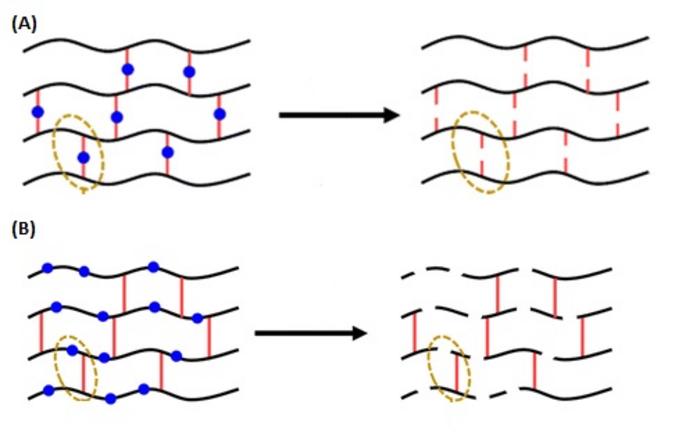A team of UK scientists has got a step closer to making several different types of plastic much easier to recycle, using a method that could be applied to a whole range of difficult-to-recycle polymers, including rubbers, gels and adhesives.

Credit: Maciek Kopec
A team of UK scientists has got a step closer to making several different types of plastic much easier to recycle, using a method that could be applied to a whole range of difficult-to-recycle polymers, including rubbers, gels and adhesives.
Thermoplastics and thermosets are two types of plastics that both consist of long chains of molecules called polymers but behave differently when heated.
Thermoplastics can be heated to high temperatures, poured into a mould then cooled to make the desired shape. They can subsequently be melted and reformed into other shapes when they are recycled, however they can break when stretched or stressed.
In contrast, the polymer chains in thermoset plastics are crosslinked to form a network which makes them incredibly strong and flexible. They are often used in composite materials, paints, coatings, rubbers and gels. Unfortunately, however, the crosslinks mean that the materials burn rather than melt when heated, making them much harder to break down and recycle.
Now, researchers at the University of Bath and University of Surrey have developed a way of introducing degradable bonds into thermoset polymers to make them more easily recyclable.
Publishing in Polymer Chemistry, they made a series of polymer gels with breakable bonds incorporated into different parts of the structure, and tested whether the properties changed after the gel was degraded and reformed.
They found that whilst all the gels could be degraded to some extent, gels with breakable bonds in the polymer chains (B in the attached diagram) retained their properties much better when reformed, compared with the polymers that were broken down via the cross-linked bonds (A).
The researchers hope this model system can be applied to other types of polymers, including adhesives, sealants and elastomers.
Dr Maciek Kopeć, from the University of Bath’s Department of Chemistry, said: “Thermosets are used widely in the commercial sector, in materials like resins and adhesives.
“Being able to make bonds reversible in these materials will increase their applications as well as making them more recyclable.”
The researchers aim to create a general road map of the best locations for these breakable bonds, to understand better why some bonds break more easily than others, and plan to optimise the system using other commercially used polymers.
The researchers are also looking at other applications of the work, including using crosslinked polymers as vehicles for controlled drug delivery systems.
The work was funded by the Engineering and Physical Sciences Research Council (EPSRC).
Journal
Polymer Chemistry
DOI
10.1039/D3PY01008B
Method of Research
Experimental study
Subject of Research
Not applicable
Article Title
Strands vs. crosslinks: topology-dependent degradation and regelation of polyacrylate networks synthesised by RAFT polymerisation
Article Publication Date
6-Nov-2023




